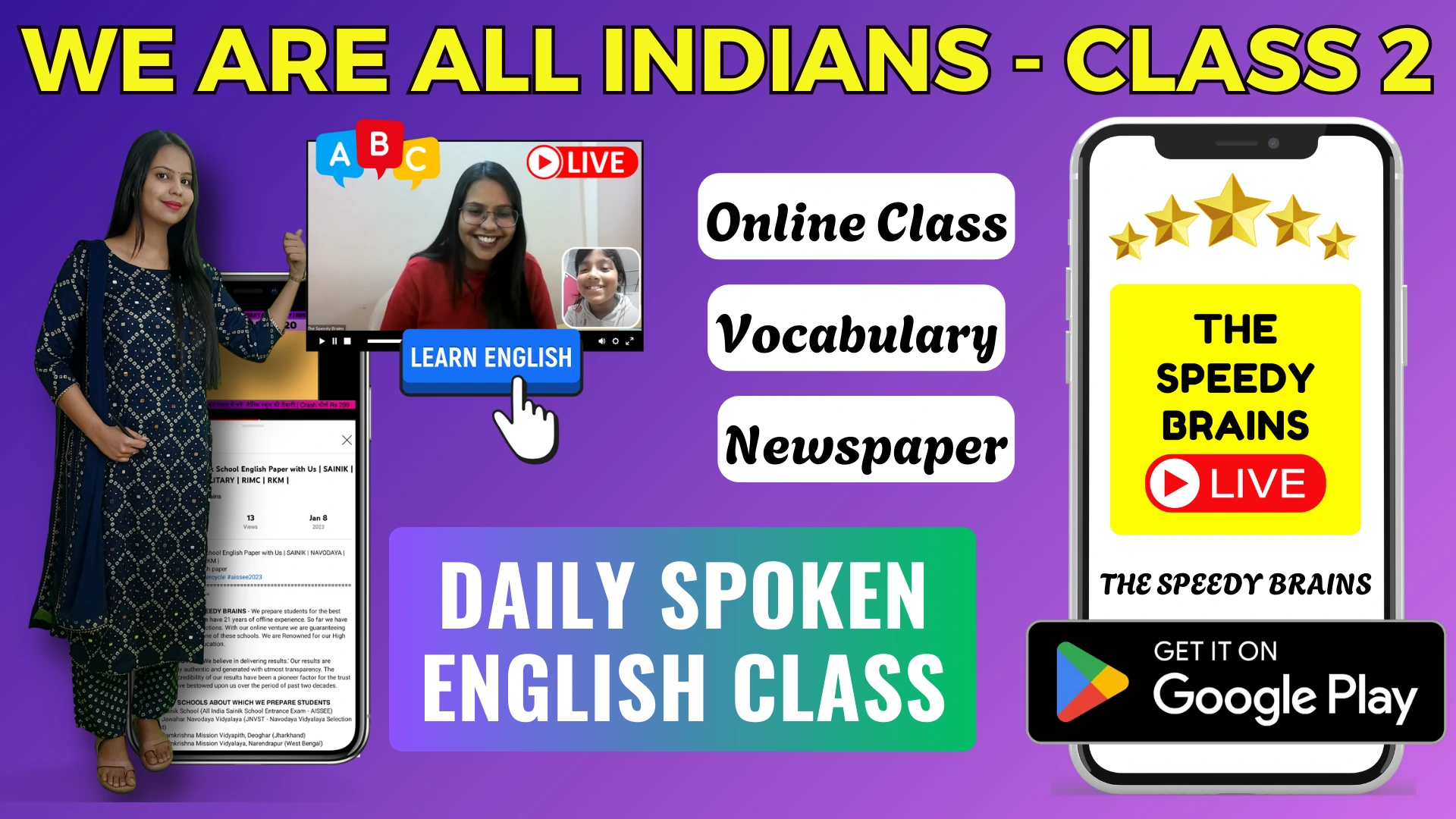
We are all Indians – Class 2 English NCERT Solutions
Explore the solutions for “We are all Indians,” Class 2 English NCERT. This chapter teaches children about India’s unity in diversity. Students learn about different states, languages, festivals, and cultures of India. The chapter promotes the message that though we are from different parts of India and speak different languages, we are all Indians and each one of us is unique.
Summary in English
The chapter introduces children from different states of India. Each character shares information about their state, the language they speak, and something unique about their culture. We meet Ramu from Gujarat who dances Garba, Meenakshi from Tamil Nadu who celebrates Pongal, Gulabo from Rajasthan who enjoys puppet shows, Badal from Bengal who studies at Santiniketan, and many more. The chapter also includes a story about Charkha and Mahatma Gandhi, teaching children about our freedom struggle and the importance of self-reliance.
हिंदी में सारांश (Summary in Hindi)
इस पाठ में भारत के विभिन्न राज्यों के बच्चों का परिचय दिया गया है। हर पात्र अपने राज्य, अपनी भाषा और अपनी संस्कृति की कुछ विशेषताओं के बारे में बताता है। हम गुजरात से रामू से मिलते हैं जो गरबा नृत्य करता है, तमिलनाडु से मीनाक्षी से मिलते हैं जो पोंगल मनाती है, राजस्थान से गुलाबो से मिलते हैं जो कठपुतली के खेल का आनंद लेती है, बंगाल से बादल से मिलते हैं जो शांतिनिकेतन में पढ़ता है, और भी कई पात्र हैं। इस पाठ में चरखा और महात्मा गांधी की कहानी भी शामिल है, जो बच्चों को हमारे स्वतंत्रता संग्राम और आत्मनिर्भरता के महत्व के बारे में सिखाती है।
Word Meanings
| Sl | English Word | Hindi Meaning | English Meaning |
|---|---|---|---|
| 1 | Festival | त्योहार | A day or period of celebration |
| 2 | Puppet | कठपुतली | A doll or figure moved by strings |
| 3 | Monument | स्मारक | A historic building or structure |
| 4 | Unique | अनोखा | Being the only one of its kind |
| 5 | Charkha | चरखा | Spinning wheel |
| 6 | Neighbour | पड़ोसी | A person living near |
| 7 | Harvest | फसल | The process of gathering crops |
| 8 | Self-reliance | आत्मनिर्भरता | Ability to depend on oneself |
| 9 | Freedom | स्वतंत्रता | The power to act or speak freely |
| 10 | Culture | संस्कृति | The customs of a particular group |
| 11 | Independence | आजादी | Freedom from control |
| 12 | Traditional | पारंपरिक | Following old customs |
| 13 | Celebrate | मनाना | To observe a special occasion |
| 14 | Diverse | विविध | Showing great variety |
| 15 | Nation | राष्ट्र | A country with its own government |
Let us speak
A. What do you say when:
1. You want to enter the classroom.
“May I come in, teacher?”
2. You want to visit the washroom.
“May I go to the washroom, please?”
3. You want to borrow a book from your friend.
“Can I please borrow your book?”
4. You hurt someone by mistake.
“I am sorry, I didn’t mean to hurt you.”
5. You need a pencil and your friend gives you a pencil.
“Thank you for lending me the pencil.”
B. Choose a partner. Ask one another the following questions:
6. What language do you speak?
I speak Hindi and English.
7. Can you speak more than one language?
Yes, I can speak Hindi, English, and a little bit of my mother tongue.
8. Which is your favourite dish?
My favourite dish is Rajma Chawal.
9. Which is your favourite tree?
My favourite tree is the mango tree because it gives us sweet fruits.
Let us write
A. Discuss with your teacher and answer the following questions:
1. What do we call the people who live in India?
The people who live in India are called Indians.
2. Name the festival of colours.
Holi is the festival of colours.
3. Which festival do you like the most? Why?
I like Diwali the most because we light diyas, decorate our house, meet relatives, and share sweets with everyone. The festival brings happiness and joy to all.
B. Rearrange the jumbled letters. The answers will be the names of languages:
1. INHDI
Answer: HINDI
2. GNIELHS
Answer: ENGLISH
3. RUUD
Answer: URDU
4. ELUTGU
Answer: TELUGU
C. Join the given sentences using ‘but’:
1. Sentence 1: I like milk.
Sentence 2: I don’t like tea.
Answer: I like milk but I don’t like tea.
2. Sentence 1: My grandfather is old.
Sentence 2: He is strong.
Answer: My grandfather is old but he is strong.
3. Sentence 1: I wanted to go out.
Sentence 2: I was too tired.
Answer: I wanted to go out but I was too tired.
Let us draw
A. Draw one thing that you like the most in your home.
Note: This is a drawing activity where students need to draw something they like from their home, such as their bed, television, toys, or books.
Let us listen
Frame sentences using the given set of words:
Here are some sentences using the given words:
- The brown dog crossed the bridge to get some bread.
- My sister wore a pretty pink frock and jumped like a frog.
- I put my family photo in a beautiful frame.
Project Work
Format for presentation about folk songs:
Here’s how to present your folk song:
- Start by saying: “My name is [your name]”
- Tell where your family is from: “My parents/grandparents belong to [village/state name]”
- Share your mother tongue: “My mother tongue is [language name]”
- Explain your song: “The main idea of my song is [brief explanation]”
- Then sing the song you learned